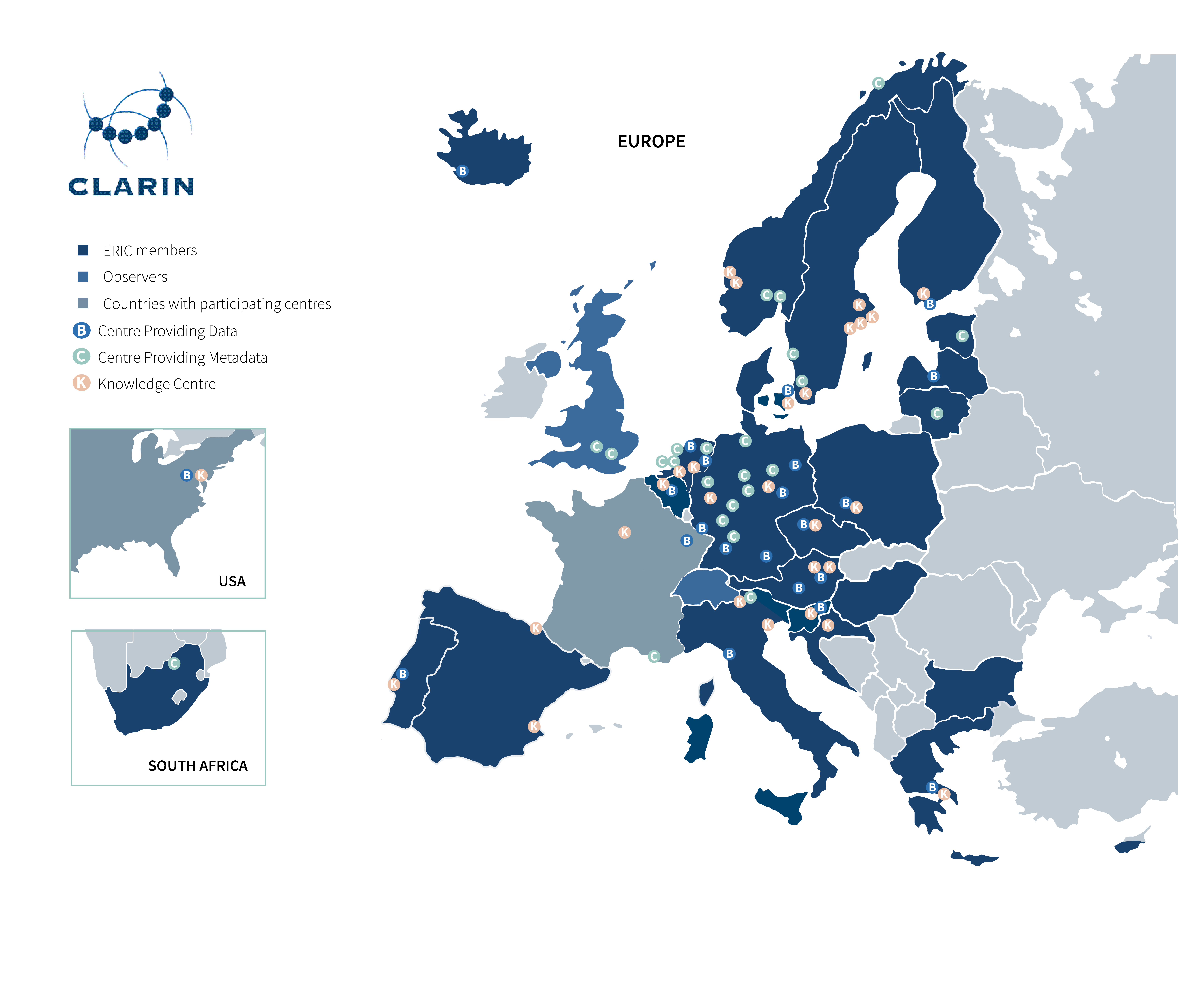The majority of operations, services and centres of the CLARIN infrastructure is provided and funded by CLARIN ERIC members, as well as observers. Members and observers can be countries or intergovernmental organisations. They set up a national consortium, typically consisting of universities, research institutions, libraries and public archives, of which at least one has the status of CLARIN centre (see overview of CLARIN centres). All members and observers create and provide access to digital language data collections, digital tools and expertise.

All consortia and third parties adhere to the same criteria for data and services interoperability, access conditions, quality of data and services. Interoperability is ensured through the standards adopted in the CLARIN framework. The access to data and content is in principle sustainable and in accordance with the principles of open science. Members and observers have a large degree of freedom to decide what they contribute to the CLARIN infrastructure.
Below is the list of current CLARIN members, observers and third parties, with the links to their national consortia. The national coordinators meet regularly in the National Coordinators' Forum. Each member country is also represented by a delegate in the General Assembly of CLARIN ERIC.
If you would like to get in touch with a national consortia, please contact the relevant National Coordinator.
| Members | National Consortium (NC) | Leading NC Partner |
|---|---|---|
| Austria | CLARIAH-AT | ACDH-CH |
| Belgium | CLARIN BE | Instituut voor de Nederlandse Taal (INT) |
| Bulgaria | CLaDA-BG | Bulgarian Academy of Sciences |
| Croatia | HR-CLARIN | University of Zagreb |
| Cyprus | CLARIN-CY | Digital Heritage Research Lab (Cyprus University of Technology) |
| Czech Republic | LINDAT/CLARIAH-CZ | Charles University Prague |
| Denmark | CLARIN-DK | University of Copenhagen |
| Estonia | CLARIN Estonia | Center of Estonian Language Resources |
| Finland | FIN-CLARIN | University of Helsinki |
| Germany | CLARIN-D | Institut fuer Deutsche Sprache, University of Mannheim |
| Greece | clarin:el | ILSP-ATHENA Research Center |
| Hungary | HunCLARIN | Hungarian Research Centre for Linguistics |
| Iceland | CLARIN Iceland | The Árni Magnússon Institute for Icelandic Studies |
| Italy | CLARIN-IT | Institute for Computational Linguistics A. Zampolli, Italian National Research Council |
| Latvia | CLARIN-LV | Institute of Mathematics and Computer Science, University of Latvia |
| Lithuania | CLARIN-LT | Vytautas Magnus University |
| The Netherlands | CLARIAH-NL | KNAW Humanities Cluster |
| Norway | CLARINO | University of Bergen |
| Poland | CLARIN PL | Wroclaw University of Technology |
| Portugal | PORTULAN CLARIN | University of Lisbon |
| Slovenia | CLARIN.SI | Jožef Stefan Institute |
| South Africa | SADiLaR | North-West University |
| Spain | CLARIAH-ES | Basque Center for Language Technology (HiTZ) |
| Sweden | SWE-CLARIN | Språkbanken |
| Observer | National Consortium (NC) | Leading Partner NC |
| Switzerland | CLARIN-CH | University of Zurich |
| United Kingdom | CLARIN-UK | Oxford University |